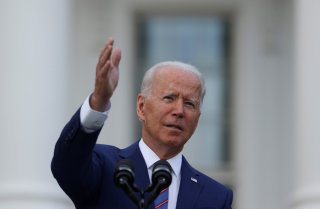Can Biden Spend His Way Out of Economic Disaster?
The Congressional Budget Office said Friday that the baseline federal budget for fiscal year 2021 is $3 trillion. That’s $130 million less than for the previous year, although still much higher than the deficit in 2019.
Key Point: The passage of stimulus packages in 2020 and 2021 has had big effects on the economy, from lifting large numbers of people from poverty and hunger to giving people more money to put back into the economy. But it’s also, indisputably, added to the federal budget deficit.
The Congressional Budget Office said Friday that the baseline federal budget for fiscal year 2021 is $3 trillion. That’s $130 million less than for the previous year, although still much higher than the deficit in 2019.
“Relative to the size of the economy, this year’s deficit is projected to total 13.4 percent of gross domestic product (GDP), making it the second largest since 1945, exceeded only by the 14.9 percent shortfall recorded last year,” the CBO said in an update. “The economic disruption caused by the 2020–2021 coronavirus pandemic and the legislation enacted in response continue to weigh on the deficit (which was already large by historical standards before the pandemic).”
However, the CBO also said that it expects the deficit to lower again once the stimulus wears off.
“Baseline deficits under current law are significantly smaller after 2021 and average $1.2 trillion from 2022 to 2031. They average 4.2 percent of GDP through 2031, well above their 50-year average of 3.3 percent. In CBO’s projections, the deficit declines to about 3 percent of GDP in 2023 and 2024 before increasing again, reaching 5.5 percent in 2031,” the CBO said. “By the end of the period, both primary deficits (which exclude net outlays for interest) and interest outlays are increasing in nominal terms and as a share of GDP.”
According to The Washington Post, the government is likely to spend $6.8 trillion in 2021, while collecting $3.8 trillion in revenue.
The CBO also predicted that inflation will rise 3 percent this year, before dropping back to 2 percent next year, in agreement with the views of the Fed. The agency also predicted robust economic growth for the post-pandemic era, as high as 7.4 percent in fiscal year 2021.
“It’s more than any other year besides last year, which is in line with what we expect given the American Rescue Plan,” Marc Goldwein, the senior vice president at the nonpartisan Committee for a Responsible Federal Budget, told The Washington Post.
“If there’s one thing we should have learned from the last 10 years, it’s that fears of government debt have been greatly exaggerated,” J. W. Mason, a professor of economics at the City University of New York, told The Washington Post. “In the U.S. and other rich countries, we have seen historically high debt levels with none of the negative consequences that they were expected to bring.”
Stephen Silver, a technology writer for the National Interest, is a journalist, essayist and film critic, who is also a contributor to The Philadelphia Inquirer, Philly Voice, Philadelphia Weekly, the Jewish Telegraphic Agency, Living Life Fearless, Backstage magazine, Broad Street Review and Splice Today. The co-founder of the Philadelphia Film Critics Circle, Stephen lives in suburban Philadelphia with his wife and two sons. Follow him on Twitter at @StephenSilver.
Image: Reuters.

